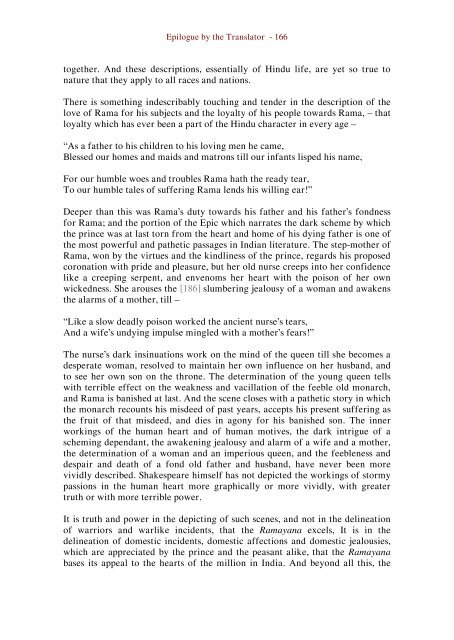Ramayana, Epic of Rama, Prince of India
An Abbreviated Translation of the Indian Classic, the Ramayana by Romesh Chundar Dutt in 2,000 verses
An Abbreviated Translation of the Indian Classic, the Ramayana by Romesh Chundar Dutt in 2,000 verses
Create successful ePaper yourself
Turn your PDF publications into a flip-book with our unique Google optimized e-Paper software.
Epilogue by the Translator - 166<br />
together. And these descriptions, essentially <strong>of</strong> Hindu life, are yet so true to<br />
nature that they apply to all races and nations.<br />
There is something indescribably touching and tender in the description <strong>of</strong> the<br />
love <strong>of</strong> <strong>Rama</strong> for his subjects and the loyalty <strong>of</strong> his people towards <strong>Rama</strong>, – that<br />
loyalty which has ever been a part <strong>of</strong> the Hindu character in every age –<br />
“As a father to his children to his loving men he came,<br />
Blessed our homes and maids and matrons till our infants lisped his name,<br />
For our humble woes and troubles <strong>Rama</strong> hath the ready tear,<br />
To our humble tales <strong>of</strong> suffering <strong>Rama</strong> lends his willing ear!”<br />
Deeper than this was <strong>Rama</strong>’s duty towards his father and his father’s fondness<br />
for <strong>Rama</strong>; and the portion <strong>of</strong> the <strong>Epic</strong> which narrates the dark scheme by which<br />
the prince was at last torn from the heart and home <strong>of</strong> his dying father is one <strong>of</strong><br />
the most powerful and pathetic passages in <strong>India</strong>n literature. The step-mother <strong>of</strong><br />
<strong>Rama</strong>, won by the virtues and the kindliness <strong>of</strong> the prince, regards his proposed<br />
coronation with pride and pleasure, but her old nurse creeps into her confidence<br />
like a creeping serpent, and envenoms her heart with the poison <strong>of</strong> her own<br />
wickedness. She arouses the [186] slumbering jealousy <strong>of</strong> a woman and awakens<br />
the alarms <strong>of</strong> a mother, till –<br />
“Like a slow deadly poison worked the ancient nurse’s tears,<br />
And a wife’s undying impulse mingled with a mother’s fears!”<br />
The nurse’s dark insinuations work on the mind <strong>of</strong> the queen till she becomes a<br />
desperate woman, resolved to maintain her own influence on her husband, and<br />
to see her own son on the throne. The determination <strong>of</strong> the young queen tells<br />
with terrible effect on the weakness and vacillation <strong>of</strong> the feeble old monarch,<br />
and <strong>Rama</strong> is banished at last. And the scene closes with a pathetic story in which<br />
the monarch recounts his misdeed <strong>of</strong> past years, accepts his present suffering as<br />
the fruit <strong>of</strong> that misdeed, and dies in agony for his banished son. The inner<br />
workings <strong>of</strong> the human heart and <strong>of</strong> human motives, the dark intrigue <strong>of</strong> a<br />
scheming dependant, the awakening jealousy and alarm <strong>of</strong> a wife and a mother,<br />
the determination <strong>of</strong> a woman and an imperious queen, and the feebleness and<br />
despair and death <strong>of</strong> a fond old father and husband, have never been more<br />
vividly described. Shakespeare himself has not depicted the workings <strong>of</strong> stormy<br />
passions in the human heart more graphically or more vividly, with greater<br />
truth or with more terrible power.<br />
It is truth and power in the depicting <strong>of</strong> such scenes, and not in the delineation<br />
<strong>of</strong> warriors and warlike incidents, that the <strong><strong>Rama</strong>yana</strong> excels, It is in the<br />
delineation <strong>of</strong> domestic incidents, domestic affections and domestic jealousies,<br />
which are appreciated by the prince and the peasant alike, that the <strong><strong>Rama</strong>yana</strong><br />
bases its appeal to the hearts <strong>of</strong> the million in <strong>India</strong>. And beyond all this, the

















